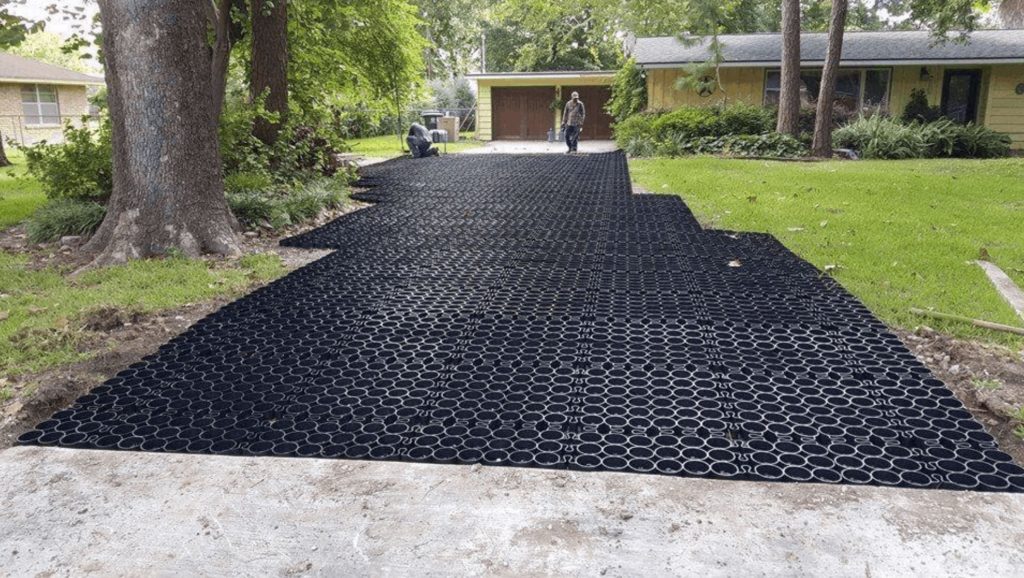Asphalt driveways are the most common type of driveway. While many materials can be used to create a driveway, asphalt has long been favored for a variety of reasons.
When building an asphalt driveway, however, it’s important to take into account the depth of the driveway.

Some asphalt driveways need to be thicker than others depending on how they will be used and what kind of soil they’re being built on.
If you’re looking to build an asphalt driveway, let’s take a look at what goes into determining how deep it should be, as well as a thinner alternative you might prefer.
Determining the Ideal Thickness of an Asphalt Driveway
There are a handful of factors that go into deciding how thick an asphalt driveway should be. For the standard residential driveway built on sandy, gravelly, or rocky soil, 2-3 inches of thickness is required.
Having a 2-inch thick asphalt driveway is suitable for many people, but 3 inches will provide extra durability. If you plan on driving or parking heavier vehicles, 3 inches is the best way to ensure you don’t end up cracking your driveway.
For the subsurface of an asphalt driveway, 6-8 inches of granular base aggregate is required. This is so you can have a durable and level surface to pour the asphalt over, since regular soil is prone to shifting and washing out.

When it comes to the soil beneath the aggregate, you may need to excavate it even further if it’s of a certain composition. For instance, clay or loamy soil provides inadequate drainage and would need to be replaced.
How thick should driveway asphalt be for commercial usage? The answer is no less than 3 inches. 3 inches is the standard asphalt thickness for commercial purposes and provides enough durability to handle the weight, pressure, and traffic that commercial driveways are typically subjected to.
When it comes to the granular base aggregate for commercial asphalt driveways, you need no less than 8 inches below the asphalt. Commercial parking lots, however, can settle on 6 inches of granular base aggregate. You also need soil with good drainage below the aggregate, and clay or loamy soil will not suffice.
How thick should an asphalt driveway be for heavy-duty commercial purposes? The answer is 4 to 7 inches. This includes binder and finish levels as well, which are needed for especially heavy-duty purposes.
Driveways near loading docks and driveways that consistently handle big trucks are examples that would need this level of thickness. In general, 6 inches of asphalt over at least 3 inches of aggregate base is what’s required for heavy-duty commercial driveways.
The Consequences of Having an Asphalt Driveway That Isn’t Thick Enough
The reason that the thickness of asphalt driveway is so important is because not having enough thickness can lead to extensive damage down the line.
An asphalt driveway that’s too thin will not distribute weight properly. When this happens, the asphalt is compressed under tires and stretched to the point that it develops fatigue cracks. Once fatigue cracks develop, water can seep in and begin freezing and thawing, which can widen the cracks to the point where the entire surface is compromised.
However, even in areas without a freeze/thaw cycle, the continued pressure of vehicles will widen the fatigue cracks until they also end up causing massive damage that needs to be repaired.
A Thinner Paving Option for Driveways
The best thin alternative to an asphalt driveway is one made from permeable plastic pavers. The total thickness of an asphalt driveway when including the sub-surface can reach upwards of 15 inches.

With permeable plastic pavers made by TRUEGRID, however, you only need 6 – 8 inches of thickness beneath the pavers. The pavers are made from 100% post-consumer recycled high density plastic.
In short, only an excavation of about 128 inches is required to install a permeable plastic paver driveway. TRUEGRID PRO LITE and TRUEGRID PRO PLUS pavers are made from 100%-recycled plastic and will last up to 60 years with minimal maintenance required.
They can withstand the weight of a monster truck driving off a ramp and landing on them without breaking. The pavers on the surface snap together as easily as LEGO blocks and they trap gravel within their empty cells. This creates a level surface with tons of traction that never shifts or breaks down.

TRUEGRID pavers are 100%-permeable and don’t require any additional drainage like asphalt does. Stormwater will flow directly through the pavers and into the soil below, to help prevent erosion and flooding.
TRUEGRID Pavers Are Thinner and More Durable Than Asphalt
If you want a driveway paving solution that looks great, is incredibly eco-friendly, and durable enough to last 60 years before needing replacement, look no further than TRUEGRID permeable pavement.
Contact TRUEGRID today to get in touch with a pavement specialist who can answer your questions!



